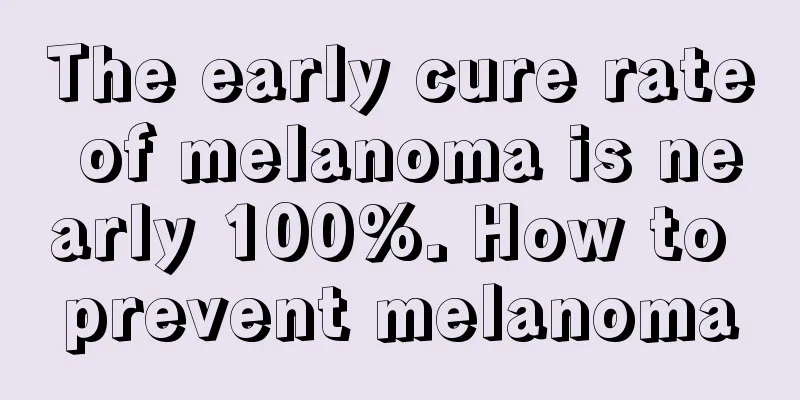The early cure rate of melanoma is nearly 100%. How to prevent melanoma

|
The five-year cure rate for early-stage melanoma is close to 100%, while the five-year survival rate for patients in the late stage is only 5% to 10%. If you find any of the following changes in your moles, you must be highly alert. If moles on the body show these conditions, be alert that they may turn into melanoma 1. The area or volume suddenly increases, and the color becomes darker or changes. 2. Redness, swelling and inflammation of the pigmented nevus or its surrounding area. 3. The pigmented nevus begins to grow asymmetrically, for example, one side is larger than the other side, or one side is darker than the other side. 4. The surface changes from smooth to rough, and may even ulcerate, ooze, and bleed. 5. Several small black dots suddenly appear around a pigmented mole, which is called a satellite mole. 6. A mole suddenly feels itchy and painful. How to prevent melanoma 1. Pay attention to ultraviolet radiation Clinically, ultraviolet radiation is one of the causes of malignant melanoma. Ultraviolet rays are very sensitive to DNA damage and can lead to a decrease in systemic immunity. Many data support the pathogenic effects of sunlight and ultraviolet rays. Some people believe that there is insufficient evidence that sunlight causes melanoma and have proposed the sunlight cycle factor hypothesis, which holds that sunlight exposure causes the body to produce a factor that circulates with the blood to other parts of the body, stimulating melanocytes to become malignant. 2. Pay attention to the protection or treatment of existing pigmented nevi It is also important to pay attention to the protection of existing pigmented nevi or to carry out scientific treatment in time in order to prevent melanoma. It is well known that junctional nevi and junctional components in mixed nevi can be malignant and transform into melanoma. Junctional nevi are mainly the phenotype of pigmented nevi on the skin of infants or children. They rarely become malignant before puberty. After puberty, most junctional nevi have turned into intradermal nevi. Only a few parts such as the palms, soles, scrotum, and labia still retain the characteristics of junctional nevi in adults. Therefore, these nevi have the greatest potential for malignant transformation. |
<<: What are the causes of osteofibroma
>>: What is the difference between melanoma and mole?
Recommend
How to choose a good casserole
Many people like to use clay pots to make their o...
What are the benefits of soaking dried olives in water
Olive is a kind of fruit, and people like to make...
What are the benefits of moxibustion on the top of the head
Acupuncture is the use of silver needles to perfo...
What kind of disease hidden behind sudden weight loss
Recently, Cecilia Cheung was in pain because of t...
What to do if you stutter
There are all kinds of people in society, and peo...
What are the types of diabetes
The formation of diabetes is not accidental. It i...
The little red spots on my legs are very itchy
Small red spots on the legs are a health problem ...
Can women with kidney cancer have children?
It is usually not recommended for female kidney c...
Is strenuous exercise suitable for patients with gallbladder cancer?
There are many ways to treat gallbladder cancer. ...
Can I still exercise if I have sore muscles? How to solve it?
Muscle soreness is a common symptom of muscle abn...
On which day will milk swelling be the most painful after weaning?
Postpartum mothers need to breastfeed for a long ...
How to kill live snakehead fish
Some people like to eat black fish, which is a re...
What harm does nail polish do to the body
Nowadays, the pursuit of beauty has extended to e...
What methods can be used to regulate insufficient gastric motility?
Insufficient gastric motility is a common disease...
How to get rid of the monkey on the face
Although warts on the face do not hurt or itch, t...









